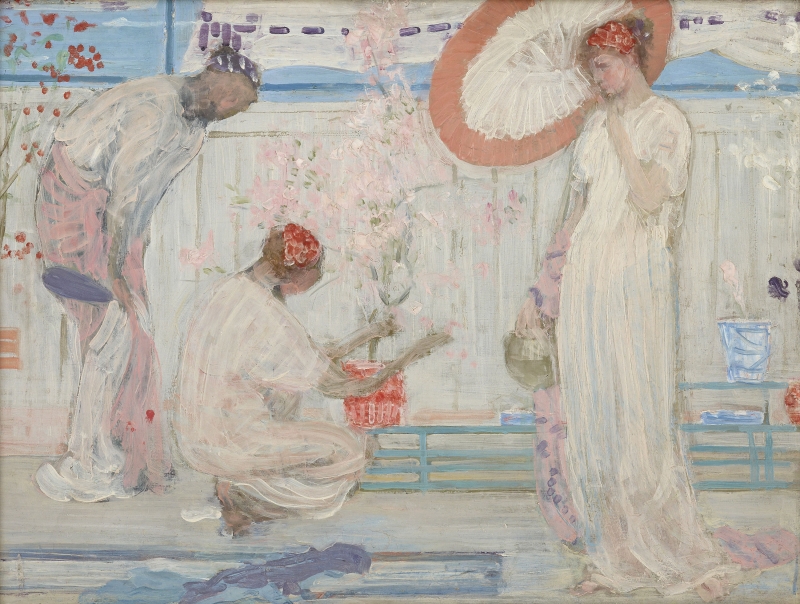Provenance
- 1879: acquired at the time of Whistler's bankruptcy by Thomas Way (1837-1915) and passed to his son Thomas Robert Way (1861-1913) , London;
- 1902: sold by T. R. Way to Charles Lang Freer (1856-1919) , Detroit;
- 1919: bequeathed by C. L. Freer to the Freer Gallery of Art.
On 5 October 1867 Whistler wrote to Frederick Richards Leyland (1832-1892) of Liverpool, asking for an advance of £100 and stated, 'I think that you will be pleased with the final oil sketch of your picture', the latter being The Three Girls [YMSM 088]. 1
According to T. R. Way, The White Symphony: Three Girls was sold to his father by Whistler at the time of Whistler's bankruptcy. 2 Way jr. sold it to C. L. Freer in 1902 for $4800.
Exhibitions
- 1874: Mr Whistler's Exhibition, Flemish Gallery, 48 Pall Mall, London, 1874 (cat. no. 13) as 'Symphony in White and Red' under the heading 'Sketches for Large Paintings'.
- 1887: 64th Annual Exhibition, Royal Society of British Artists, London, 1887 London, RBA, 1887-8 (cat. no. 352) as 'Symphony in White and Red'.
- 1904: Oil Paintings, Water Colors, Pastels and Drawings: Memorial Exhibition of the Works of Mr. J. McNeill Whistler, Copley Society, Boston, 1904 (cat. no. 19) as 'The White Symphony'.
- 1905: Œuvres de James McNeill Whistler, Palais de l'Ecole des Beaux-Arts, Paris, 1905 (cat. no. 11).
In the Pall Mall exhibition of 1874 it was described by an art critic simply as 'some girls arranging flowers in bright sunlight:'
'As another attractive feature of the gallery, we have a certain number of designs for pictures. These are painted in oil, but without any fullness of realisation, and giving merely the artist's first thought of the design and colour that is to be thrown into the finished work. One of these represents four female figures on the sea shore; another is of some girls arranging flowers in bright sunlight; and there are two more, neither of which reveal to us their subject with sufficient clearness. We just perceive a fascination of dimly suggested scheme of colour, and note here and there a graceful attitude defining itself from the obscurity of the general mist.' 3
The selection of this painting in 1887 for the winter exhibition at the RBA showed, as Anna Robins comments, 'how important these colour experiments were for the later oil panels.' 4 At the time, 'Symphony in White and Red' was quite well received. The Sunday Times gave it a rave review:
'Nothing ... that Mr. Whistler has ever painted is more exquisite in colour-harmony or grace of design than the "Symphony in White and Red" ... It is poetic — as indeed, all Mr. Whistler's work is — not that it is in any degree literary (Heaven defend me from suggesting such thing in connection with the President's art !), but it is so, in that it might have suggested a poem to Keats himself, so simple, pure, and Greek it is.' 5
The Magazine of Art commented:
'Mr. Whistler himself is represented first by a truly beautiful colour-study in the quasi-Japanese mode, "Symphony in White and Red," which apparently is a comparatively early work of the painter. The subtlety and daring, the unerring success with which the brilliant gradations of red and purple - violet are distributed, make us more than ever regret that the master should disdain technical achievements which he finds too easy in order to attain the impossible in dealing with endless varieties of black and grey.' 6
On the other hand the Daily Chronicle thought it would 'awaken much Philistine hostility' and Whistler's more recent seascapes, and the Graphic thought it 'vague and undefined in form, but exquisite in quality and arrangement of form and colour.' 7
C. L. Freer lent the painting to several exhibitions in his lifetime, including the Boston exhibition of 1904, where the 'Projects' were exhibited together, as shown in the photograph reproduced above. However, by the terms of C. L. Freer's bequest to the Freer Gallery of Art, the painting cannot now be lent to any other venue.
Notes:
3: 'Exhibition of Mr. Whistler's Paintings and Drawings', Globe, London, 20 June 1874, p. 2. Press cutting in GUL Whistler PC 1, p. 79.
4: Robins 2007 [more] , p. 28.
5: 'Royal Society of British Artists', Sunday Times, 27 November 1887. Press cutting in GUL Whistler PC9, p. 14.
6: Magazine of Art, 1 February 1888; GUL Whistler PC9, p. 59.
7: 'The Royal Society of British Artists', Daily Chronicle, London, 28 November 1887; 'Royal Society of British Artists', Graphic, 3 December 1887; GUL Whistler PC9, pp. 15, 20.
Last updated: 23rd November 2020 by Margaret






